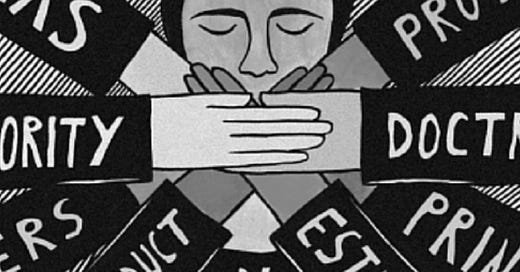Sheeeeeeesh. Both of them? Together? Seriously?
The tech bros are an excellent target for jokes, but authoritarianism takes the cake.
I think about authoritarianism and how authoritarian regimes can violate their citizens, stripping them of their ability to access the internet. Or by using technologically advanced ways of restricting views from the opposition. But these days, it’s not just about the internet. It’s about access.
The internet represents access to the outside world globally.
Now, I wouldn’t want to throw the term, authoritarian around loosely. In fact, according to the Brookings Institute, a public policy think tank in Washington, D.C., there have been 606 events where states disconnected internet exchange points or blocked significant amounts of certain kinds of traffic. 39% of these incidents occurred in democracies, while 52% occurred in authoritarian regimes. Clearly, tools for interfering with digital networks are not reserved for authoritarians.
Here is my point.
Some Americans are clamoring for free speech, citing the first amendment, while others seek to censor or restrict what is often labeled as ‘misinformation.’ And, just because the first amendment doesn’t cover digital spaces, doesn’t mean that the government isn’t actively looking for ways to take control of digital space.
Look at the battle over who is responsible for the issues Facebook is credited for creating. Currently, Facebook is protected by Section 230 of the Communications Deceny Act.
Or look at the on going argument about how digital spaces are moderated. This just broke over the weekend via The Washington Post:
Conspiracy theorists, banned on major social networks, connect with audiences on newsletters and podcasts
Here is the VP of Communication at Substack’s response to the above article.

And the standoff begins…
In many ways, it seems The Washington Posts critique is at odds with its own tagline, “Democracy Dies in Darkness.” (There is so much embedded in that tagline.)
All I am saying, is that there might be a little bit more to certain networks of information, than it being purely “misinformation.” I think it’s time to investigate further.
Who is right?
Misinformation is terrible, yes. So is using the internet as a mechanism to prevent people from expressing how they feel. What if underlying certain expressions are legitimate forms of political dissent? Is censoring or restricting speech online leading us to the brink of illiberalism?
Who gets to set the limit for speech?
In U.S. political commentary, the liberals would say, “not the republicans.”
The Republicans would say, “not the government.”
The government would say, “not the tech companies.”
And the people would say whatever you tell them to say.
No, seriously.
Free speech or internet censorship is one of the most important conversations happening in politics at this very moment.
Is there a way to have this conversation without it getting heated?
I’ll continue this discussion on live audio (Clubhouse) this Thursday, February 3rd at 8pm MST (GMT -7.) In the meantime, I’d love to hear what you think.




Your rant is unfortunately fairly one-sided. In it you present only the meagerest statements re the harms of misinformation while in a somewhat slipshod way relating efforts to contain/counter it as authoritarian. You do not seem to appreciate that what you glide over as misinformation, can be powerful enough to bring down countries or gather a public behind policies that have zero basis in fact. I’m thinking here both of Jan 6th in the US and of the support Putin enjoys for his insane polices that is created and driven by an extraordinary misinformation campaign.
Now Putin is interesting because while he combines the two trends, it doesn’t take much effort to analyze the power of each of these separately as applied to a guy who uses both. But I would strongly push back against the artificial silos you’ve created for misinformation and authoritarian style censorship. As Jan 6th shoildve taught us, misinformation can lead directly to authoritarianism. Trumpublicans don’t believe in democracy; they believe in stealing elections, thus their misinformation campaign re the elections in numerous states and cities in which Trump lost. This “misinformation” inspired millions to take to the streets to “defend” democracy when in fact they were the ones thwarting it.
That is the power of misinformation and if they’d been successful, we’d be governed by an authoritarian/mob elected government. So when you discuss this, make sure you fairly state the stakes in play with what your tone suggests is a little bit of inconvenient misinformation on the one side v big bad authoritarianism on the other. In fact, the former is usually a necessary antecedent for the birth of the latter.